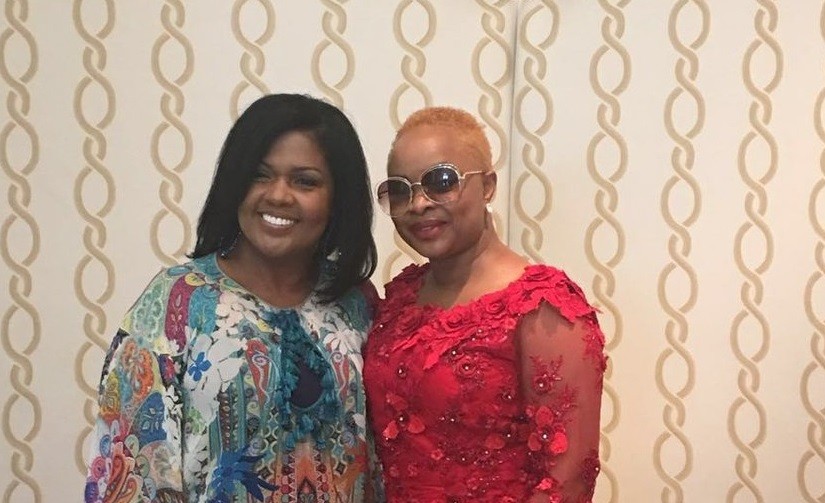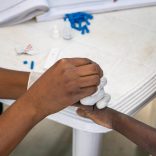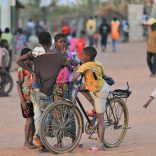Mozambique: Misinformation fuels crimes against persons with albinism - Minister
“Trailblazer Award” 2016 for Josina Machel – AIM

Twitter / Josina Machel (right) photographed with American gospell singer CeCe Winans (left) at the prize award ceremony
The US not-for-profit organization SOHO (Saving Orphans though Healthcare and Outreach) has awarded Mozambican women’s rights activist, Josina Machel, its “Trailblazer Award” for 2016.
She received the award at a gala dinner in Carmel, Indiana, in recognition of her work against domestic violence and the abuse of women. SOHO described her as a “global change agent” who has used her personal experiences “to address pressing social issues such as violence against women and girls using media platforms such as newspapers, televisions, and social media”.
Those personal experiences were traumatic. In 2015, Josina, who is the daughter of Mozambique’s first President Samora Machel and of former education minister Graca Machel, was savagely attacked by her former boyfriend. In the attack she was blinded in her right eye. The case against her assailant is still before the Mozambican courts.
Interviewed in Thursday’s issue of the independent daily “O Pais”, Josina said “I live with emotional and physical scars. There are some women who live with just one of these, but I have the misfortune to live with both. I wake up with a scar every day. I am completely blind in one eye. My face is no longer symmetrical”.
She added that, after such an assault, a woman can never be the same again. “We can say what happened, we can hang on, but we can never go back to being what we were”, she said.
“I was very hurt, because I was unable to protect myself”, Josina recalled. “My intuition wasn’t working, because I wasn’t expecting anything of the sort. It was a brutal shock. I had never suffered aggression. This was the first time, and with this result”.
She said she had decided to speak out about what had happened to her and wanted other women to break their silence.
She was concerned that many other women, perhaps from financial or emotional motives, do not denounce their abusers. “They don’t know that what is happening to them is an abuse, a violation of human rights. And if a woman doesn’t understand this, she’s never going to denounce it”, she said. “We need to break the silence and say ‘It happened to me. He beat me, they beat me’. That’s when we begin to make a difference”.
“In this way, this matter will stop being one of those things that nobody talks about, that nobody can see, nobody can know”, Josina said. “I survived. Every year thousands of women don’t survive”.
What impact might this have on family life?, she asked “What kind of children are we bringing up? The fact that they hear their mother screaming in the bedroom, and their father is there abusing her – should that be considered normal? How long are we going to tolerate this?”
Change in society comes “from woman to woman”, she believed. “We, as women, have to believe that we have this possibility”.
In Mozambique, “our government gives us space, as women, to denounce abuses. We are as equal as men in individual rights and freedoms. And because of this, am I going to accept that someone raises his hand against my daughter? No, I won’t!”
The statistics show that across the globe about 2.8 million women die because of domestic abuse every year. Josina hoped that it might be possible to eliminate violence against women by the time her daughter, Zizile, is 25 years old, which will be in ten years time.
“It’s an important dream”, Josina said. “At least it’s what wakes me up every day”.
She had been surprised by SOHO’s decision to honour her with the “Trailblazer Award”. Josina said SOHO “had been moved by my daily commitment in the cause of the struggle against domestic violence, and wanted to thank me for my commitment and that of the Kuhluka movement”.
Kuhluka is the NGO founded by Josina aimed at empowering the women survivors of abuse. It seeks to give them a voice and provide them with a safe haven. It works in Mozambique, South Africa and Swaziland.
The word Kuhluka means “rebirth” in the Tchopi language of southern Mozambique. The Kuhluka website explains that the word was chosen “as an invocation of the power and resilience of millions of women who survive, regenerate and rebuild their lives in spite of the brutal abuse that they go through”.
Josina said she dedicates her award “to Mozambique, to Kuhluka, and above all to the women who did not survive domestic violence. They are the women who are no longer with us today, nd remain in our memories. The meaning of the prize lies with them”.












Leave a Reply
Be the First to Comment!
You must be logged in to post a comment.
You must be logged in to post a comment.